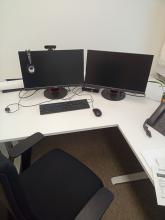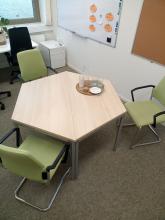We understand that the transition from studying to working can be an exciting but challenging time. But don't worry, we're here to help!
Starting your career after graduation is an important step and careful preparation can make all the difference. Early planning allows you to identify your strengths and goals, optimise your application documents and present yourself confidently in job interviews.
Our goal is to provide you with the tools and resources you need to successfully enter the job market. Our consultations are available in both German and English to ensure you feel optimally understood.

Group counselling
Take part in our interactive group consultations in which we cover various topics. Questions are welcome both during the presentation and afterwards. Due to demand, the group counselling will be held in English.
- Networking
- Job search
- Application process
- Application documents
- Application interviews
- Dos&Donts
- Booster
Please register here.

Personalised advice
Make an individual appointment with us to discuss your personal questions and concerns. Together we will discuss how you can optimise your CV or prepare for an upcoming job interview. To get the most out of the personal interview, we recommend attending the group counselling session first. Most questions will already be answered there and it is easier to deal with the remaining questions or the personal case in private.
How do you get everything out of the personal interview?
- Prepare all documents to the point where you could apply for your dream job
- If you are not currently preparing for a specific application, take your dream company and write a letter of motivation
- on a trial basis, where you currently stand and where you want to go
- send us the above points and possible questions with your request for a personal interview
- arrive on time for your appointment and bring some time with you (at least 1 hour)
The following documents can be used to help you organise your application:
Appointments for individual counselling in German
We work together with the university team at the Federal Employment Agency to offer you an ideal counselling situation. This allows us to have more time for your individual needs in the respective counselling sessions. The Federal Employment Agency focuses on all those who apply in German and are fluent in the German language. Please book one of the appointments on the following page.
Appointments for individual counselling in English and for German learners
We offer individual counselling for those who would like to apply in English as well as those who would like to apply in German but are not yet confident in the language. On Fridays, counselling appointments are available before and after the group counselling session. Please register in good time to ensure that we have enough time for you. We always assume that up to one hour is necessary and will allocate appointments accordingly in personal consultation. Please register on the following page.

Important first tips
"The distance is unimportant. Only the first step is important." (Marie de Vichy Chamrond)
By starting your studies, you have already taken an important step in your career. Think of your studies as many steps in the direction you want to take. This also means that you can already start looking left and right to sharpen your profile and make your CV more interesting. This includes soft skills, IT skills and networks. Don't wait until the end of your degree programme to think about this. Building a network in particular takes time. Analysing your potential early on will help you to focus on acquiring further skills during your studies. Not all courses take place at all times.
"Whatever you can do or dream you can do, start doing it." - Johann Wolfgang von Goethe
The start of your career may seem a long way off, both at the beginning of your degree programme and at the start of your final thesis. However, you will find yourself closer to the start of your professional life sooner than you realised. Take care of your application documents in good time and have them ready before you apply - not just two days before the interview. Allow several weeks for this and ask for help. In the simplest case, this could be friends and family who can point out spelling mistakes and formatting errors that you have overlooked. In the best case, visit a counselling centre that can find interesting places in your life in a personal conversation with experienced people.
PhD
Are you thinking about doing a doctorate at TU Bergakademie Freiberg? You can get comprehensive information and advice at the Graduate and Research Academy.
Information for students with health restrictions
There are websites specifically for students with chronic illnesses and disabilities that advertise inclusive jobs.
The website einfach-teilhaben.de offers information and tips on organising everyday life at university (especially for first-year students) with a disability/chronic illness at an early stage. You should find out about aspects such as accommodation, mobility, care and assistance here in good time and, if possible, on site.
The website reisecheckliste.org helps people with disabilities, whether mental or physical, to spend a relaxing time away from home in as relaxed a manner as possible. As a rule, people with disabilities have to pack their suitcases carefully. A packing list to tick off illustrates which items are required.
The Federal Employment Agency offers people with disabilities a wide range of support for integration into training and work. You will learn about the benefits of individual counselling, how the Medical Service and the Vocational Psychology Service of the Federal Employment Agency can support you, what vocational preparation options are available, what training and further education opportunities exist, what financial assistance is available - for example in the form of training allowance and transitional allowance or what vocational rehabilitation options are available.
The FeV - Driving Licence Ordinance offers people with disabilities the opportunity to master their everyday lives independently. They can find out which requirements and examinations are necessary to obtain a driving licence and how they can remain independent and mobile in everyday life.
Autumn camp for female students
Many female students only consider the idea that a career in science could be an option for them at a late stage. The annual autumn camp explores the question "Fancy science?". Over three days, you will gain a comprehensive insight into doctoral studies and develop a basis for making decisions about your future career.
For more information and to register, visit the Graduate and Research Academy.
Dropping out of university
Do you have doubts or problems during your studies? Would switching to a specialised apprenticeship or a skilled trade be an alternative for you? As part of the Quickstart Saxony project, we support students in switching to a suitable apprenticeship.
Interesting links and search terms
Questions about the job interview
https://www.absolventa.de/karriereguide/gespraech/vorstellungsgespraech-fragen
https://www.impulse.de/personal/vorstellungsgespraech-gute-fragen/2061339.html
Internships
https://www.jobsuma.de/karriere-ratgeber/praktika/warum-praktika-so-wichtig-sind
Vacancies and starting salaries
- Job offers
- Starting salaries
https://www.trainee-gefluester.de/tipps/gehalt/einstiegsgehalt
- Search terms
- Salary database
- Salary check
- Salary test
- Salary analysis
Scholarships and funding
https://mlp.de/#/studenten/karriere/stipendienprogramme/mint-excellence
https://tu-freiberg.de/en/economy-society/germany-scholarship
https://www.studentenwerk-freiberg.de/freiberg/finanzen/de/
https://www.studentenwerk-freiberg.de/freiberg/beratung/sozialberatung/de/
Language skills
In your application, you should always state your language skills with the level of proficiency. Here you can find an overview of the correct assessment of your foreign language skills. In addition, an online language test can help you find your way around.
The International University Centre at TUBAF has various offers to help you improve your language skills. Make use of these early on.